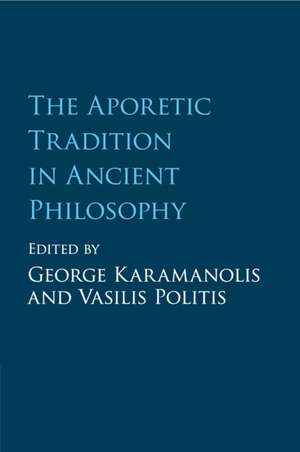The Aporetic Tradition in Ancient Philosophy
Editat de George Karamanolis, Vasilis Politisen Limba Engleză Paperback – 21 aug 2019
| Toate formatele și edițiile | Preț | Express |
|---|---|---|
| Paperback (1) | 287.28 lei 43-57 zile | |
| Cambridge University Press – 21 aug 2019 | 287.28 lei 43-57 zile | |
| Hardback (1) | 696.60 lei 43-57 zile | |
| Cambridge University Press – 27 dec 2017 | 696.60 lei 43-57 zile |
Preț: 287.28 lei
Nou
Puncte Express: 431
Preț estimativ în valută:
54.98€ • 57.19$ • 45.39£
54.98€ • 57.19$ • 45.39£
Carte tipărită la comandă
Livrare economică 14-28 aprilie
Preluare comenzi: 021 569.72.76
Specificații
ISBN-13: 9781107526631
ISBN-10: 1107526639
Pagini: 327
Ilustrații: 1 b/w illus.
Dimensiuni: 150 x 229 x 17 mm
Greutate: 0.44 kg
Editura: Cambridge University Press
Colecția Cambridge University Press
Locul publicării:New York, United States
ISBN-10: 1107526639
Pagini: 327
Ilustrații: 1 b/w illus.
Dimensiuni: 150 x 229 x 17 mm
Greutate: 0.44 kg
Editura: Cambridge University Press
Colecția Cambridge University Press
Locul publicării:New York, United States
Cuprins
Introduction George Karamanolis and Vasilis Politis; 1. Contradiction and aporia in early Greek philosophy John Palmer; 2. Socrates and the benefits of puzzlement Jan Szaif; 3. Aporia and sceptical argument in Plato's early dialogues Vasilis Politis; 4. Aporia in Plato's Parmenides Verity Harte; 5. Aporia in Plato's Theaetetus and Sophist Lesley Brown; 6. Aporia and dialectical method in Aristotle Christof Rapp; 7. Aporia in Aristotle's Metaphysics Beta Friedemann Buddensiek; 8. Uses of aporiai in Aristotle's Generation of Animals Jessica Gelber; 9. Aporia and the New Academy James Allen; 10. Aporetic elements in Plutarch's philosophy John Dillon; 11. Aporia and enquiry in ancient Pyrrhonism Luca Castagnoli; 12. Aporia and exegesis: Alexander of Aphrodisias Inna Kupreeva; 13. The aporetic character of Plotinus' philosophy George Karamanolis; 14. Aporia and the limits of reason and of language in Damascius Damian Caluori.
Recenzii
'Questions … are raised and answered in a surprisingly diverse, yet unified series of studies.' Lloyd Gerson, Journal of the History of Philosophy
Descriere
The first comprehensive study of the function and value of aporia, or puzzlement, as a key tool in ancient philosophical enquiry.
